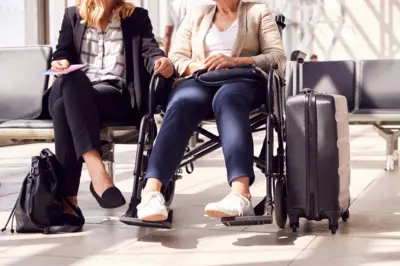We've updated our Privacy and Cookies Policy
We've made some important changes to our Privacy and Cookies Policy and we want you to know what this means for you and your data.
Warning over disability living allowance shake-up
Ministers must learn the lessons of past welfare changes or risk a proposed shake-up of disability support leaving many in poverty, a charity claims.
The Papworth Trust said 85% of claimants would have to cut back on basics if plans to replace Disability Living Allowance left them worse off.
The poll of 2,000 people also found anxiety over the reassessment process.
The government says DLA is complex and inconsistent and changes are "overdue", but stresses cash payments will remain.
The coalition is planning to replace the allowance, introduced in 1992 to help disabled people cope with the extra costs they face in their daily lives, with a new benefit called Personal Independence Payment (PIP).
Mobility concern
All 3.2 million people receiving DLA at the moment, both those in work and out of work, will be reassessed.
It is expected mobility allowances for those in care homes and the care component of the allowance paid to 650,000 people will be ended, while most recipients will receive fixed-term rather than indefinite payments in future.
Disability rights campaigners are seeking a judicial review of the proposals, part of the government's welfare reform bill, saying ministers have not properly assessed their negative impact.
The majority of people surveyed by the Papworth Trust said that if they were not eligible for PIP - or if their total benefit was reduced as a result of reassessment - they would have less to spend on basic items like food, fuel and transport.
Some 64% said they would be less independent if cuts left them worse off financially.
Although the government is still consulting on its plans, the charity said the changes risked leaving already vulnerable people further disadvantaged.
"Disabled people's daily costs are typically 25% higher than those of non-disabled people," its chief executive Adrian Bagg said.
"For example, not all public transport is accessible. This means some people have to use accessible taxis to be able to leave their home, which cost significantly more than non-accessible taxis."
The charity said it accepted that all sections of society were facing cutbacks, but that a 20% reduction in spending on PIP, compared with DLA, would leave very few recipients unaffected.
Campaigners are also urging ministers to take on board problems experienced in their shake-up of incapacity benefit when it comes to assessing people's eligibility for the new benefit.
'Inefficient'
Fitness-for work tests for those on Incapacity Benefit - known as the work capability assessment - have been heavily criticised for failing to differentiate between those with different conditions, and for not preparing claimants for the tests.
Mr Bagg said DLA claimants - particularly those with mental health problems - were "particularly anxious" about the reassessment process and how it would be conducted.
"We urge the government to learn the lessons of the work capability assessment and ensure that if they make this change, the assessment will be fair and the implications clearly explained."
Ministers say DLA has essentially remained the same for 20 years and has failed to "keep pace" with the ever-growing role played by disabled people in society and their rising aspirations.
"We have been clear that disabled people who need support will get it. However, we know that as well as millions of pounds in overpayments, lots of disabled people are being underpaid because of the inefficient DLA system," a Department for Work and Pensions spokesman said.
"That is why we are introducing an objective assessment and regular reviews - something lacking in the current system - to make sure people are getting the right levels of support."
While remaining a non means-tested cash payment, ministers say PIP will be simpler to apply for and administer.
The government says spending on DLA has risen by 30% in the past eight years and, even after the changes, projected spending in 2015-2016 would be equivalent to levels in 2009-2010.
Top Stories
More to explore
Most read
Content is not available








